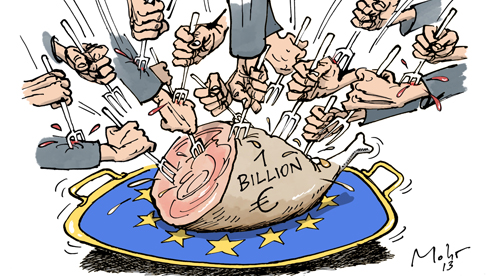The draft EU budget that has been adopted is, dare we say it, impoverished. The text confirms the lack of economic ambition and vision of the bloc at a time when we find ourselves in direct competition with the continental countries such as the United States, China and India.
Those countries pursue strategies that aim for excellence in certain sectors and that promote their champions, springboarding off their vast domestic markets to conquer the world. The draft EU budget does exactly the opposite: the future projects that could serve as a support for a European industrial strategy have been massacred. They represent just a fraction of the direct subsidies paid into agriculture and a little over a tenth of the total budget.
In contrast, we are rolling over past policies almost word for word, without asking whether they still have any relevance. And so we will continue to spend more than a third of the package over the next seven years on regional aid for countries in eastern and southern Europe.
But does Greece really need more money to build roads and roundabouts? Tensions within the eurozone have shown that these grant policies have failed because they are not conditional on verifiable and verified progress in governance, transparency and competition.
Sabotaging the general European interest
The crisis, the rapid transformation of the world economy and the extraordinary evolution of global power relations should have inspired a surge in Europe: a union against an America that is getting back on its feet, a union facing a conquering China, a union in a world in union where capital and talent are more mobile than ever before.
It was the economic crisis and terrible challenges of the 1930s that forged the federal U.S. government, whose budget climbed from 3.4 per cent of GDP in 1930 to 10 per cent by the end of the decade. History will record that Europe in crisis took the opposite path, as its budget shrank to 1 per cent of GDP. Challenges: immense. Ambition: zero.
We must draw political lessons from this mess. The budget debate has been taken hostage by one country, the United Kingdom, which may not even be part of the union tomorrow. David Cameron came to sabotage the general European interest, and he succeeded. Duly noted. In this case, though, let’s follow this through to its logical conclusion: if the strategic thinking is not done at the eurozone level, the bloc will be doomed to impotence.
To get to that level, though, relations with Germany must be repaired. That is another lesson from the drama in Brussels: the Paris-Berlin axis is no longer responsive. Let’s just ask ourselves a question: seen from Beijing or Washington, is the European paralysis really such bad news?
Was this article useful? If so we are delighted!
It is freely available because we believe that the right to free and independent information is essential for democracy. But this right is not guaranteed forever, and independence comes at a cost. We need your support in order to continue publishing independent, multilingual news for all Europeans.
Discover our subscription offers and their exclusive benefits and become a member of our community now!












